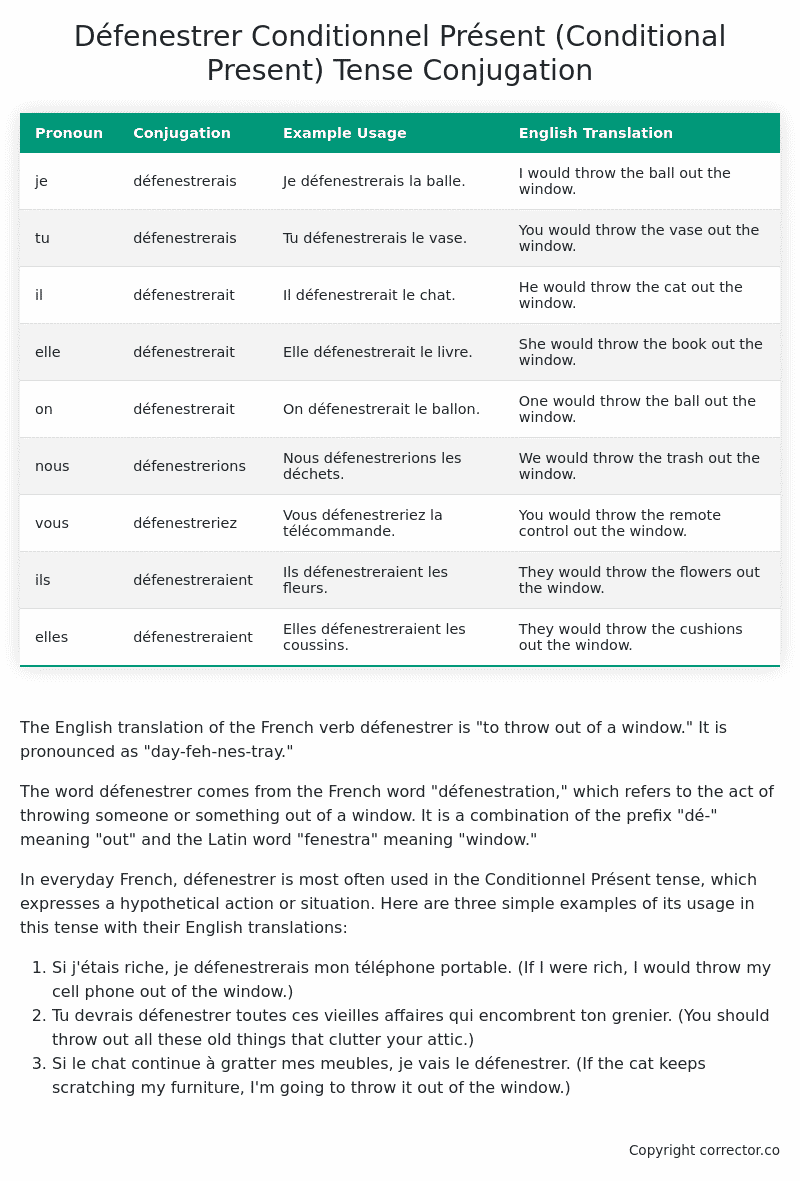Conditionnel Présent (Conditional Present) Tense Conjugation of the French Verb défenestrer
Introduction to the verb défenestrer
The English translation of the French verb défenestrer is “to throw out of a window.” It is pronounced as “day-feh-nes-tray.”
The word défenestrer comes from the French word “défenestration,” which refers to the act of throwing someone or something out of a window. It is a combination of the prefix “dé-” meaning “out” and the Latin word “fenestra” meaning “window.”
In everyday French, défenestrer is most often used in the Conditionnel Présent tense, which expresses a hypothetical action or situation. Here are three simple examples of its usage in this tense with their English translations:
- Si j’étais riche, je défenestrerais mon téléphone portable. (If I were rich, I would throw my cell phone out of the window.)
- Tu devrais défenestrer toutes ces vieilles affaires qui encombrent ton grenier. (You should throw out all these old things that clutter your attic.)
- Si le chat continue à gratter mes meubles, je vais le défenestrer. (If the cat keeps scratching my furniture, I’m going to throw it out of the window.)
Table of the Conditionnel Présent (Conditional Present) Tense Conjugation of défenestrer
| Pronoun | Conjugation | Example Usage | English Translation |
|---|---|---|---|
| je | défenestrerais | Je défenestrerais la balle. | I would throw the ball out the window. |
| tu | défenestrerais | Tu défenestrerais le vase. | You would throw the vase out the window. |
| il | défenestrerait | Il défenestrerait le chat. | He would throw the cat out the window. |
| elle | défenestrerait | Elle défenestrerait le livre. | She would throw the book out the window. |
| on | défenestrerait | On défenestrerait le ballon. | One would throw the ball out the window. |
| nous | défenestrerions | Nous défenestrerions les déchets. | We would throw the trash out the window. |
| vous | défenestreriez | Vous défenestreriez la télécommande. | You would throw the remote control out the window. |
| ils | défenestreraient | Ils défenestreraient les fleurs. | They would throw the flowers out the window. |
| elles | défenestreraient | Elles défenestreraient les coussins. | They would throw the cushions out the window. |
Other Conjugations for Défenestrer.
Le Present (Present Tense) Conjugation of the French Verb défenestrer
Imparfait (Imperfect) Tense Conjugation of the French Verb défenestrer
Passé Simple (Simple Past) Tense Conjugation of the French Verb défenestrer
Passé Composé (Present Perfect) Tense Conjugation of the French Verb défenestrer
Futur Simple (Simple Future) Tense Conjugation of the French Verb défenestrer
Futur Proche (Near Future) Tense Conjugation of the French Verb défenestrer
Plus-que-parfait (Pluperfect) Tense Conjugation of the French Verb défenestrer
Passé Antérieur (Past Anterior) Tense Conjugation of the French Verb défenestrer
Futur Antérieur (Future Anterior) Tense Conjugation of the French Verb défenestrer
Subjonctif Présent (Subjunctive Present) Tense Conjugation of the French Verb défenestrer
Subjonctif Passé (Subjunctive Past) Tense Conjugation of the French Verb défenestrer
Subjonctif Imparfait (Subjunctive Imperfect) Tense Conjugation of the French Verb défenestrer
Conditionnel Présent (Conditional Present) Tense Conjugation of the French Verb défenestrer (this article)
Conditionnel Passé (Conditional Past) Tense Conjugation of the French Verb défenestrer
L’impératif Présent (Imperative Present) Tense Conjugation of the French Verb défenestrer
L’infinitif Présent (Infinitive Present) Tense Conjugation of the French Verb défenestrer
Struggling with French verbs or the language in general? Why not use our free French Grammar Checker – no registration required!
Get a FREE Download Study Sheet of this Conjugation 🔥
Simply right click the image below, click “save image” and get your free reference for the défenestrer Conditionnel Présent tense conjugation!

Défenestrer – About the French Conditionnel Présent (Conditional Present) Tense
Formation
Common Everyday Usage Patterns
Expressing Polite Requests
Expressing Hypothetical Situations
Expressing Doubt or Uncertainty
Interactions with Other Tenses
Present Tense
Past Tense
Future Tense
Conditional Perfect
Summary
Want More?
I hope you enjoyed this article on the verb défenestrer. Still in a learning mood? Check out another TOTALLY random French verb conjugation!


